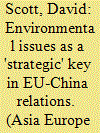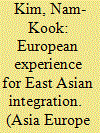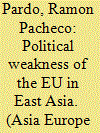|
|
|
Sort Order |
|
|
|
Items / Page
|
|
|
|
|
|
|
| Srl | Item |
| 1 |
ID:
088764


|
|
|
|
|
| Publication |
2009.
|
| Summary/Abstract |
External crises such as the Bird Flu epidemic, as well as severe environmental problems, are changing overall attitudes towards research in human health and the environment. At present, the EU is putting pressure on developing countries in Asia and elsewhere to increase their environmental capacities and put forward methods of environmental management that support innovation and competitiveness. They are also being encouraged to participate in the Kyoto protocol and Bali processes on climate change. This paper aims to address the current issues faced by the EU in promoting environmentally friendly technologies in Southeast Asia, as well as to examine the opportunities for technological cooperation between Europe and Asia. It will use Indonesia, Malaysia, Thailand, the Philippines and Vietnam-some of the EU's chosen recipients of official development assistance in the region-as case studies, in order to examine how these countries implement policies that incorporate environmental technology strategies designed to promote sustainable development. It will also attempt to identify the type of actions that are being pursued by their respective governments, with the support of the EU and its member states. Finally, the paper will suggest which types of environmentally friendly technologies and best practice could be transferred from Europe to Southeast Asia, and to the wider Asian region.
|
|
|
|
|
|
|
|
|
|
|
|
|
|
|
|
| 2 |
ID:
088758


|
|
|
|
|
| Publication |
2009.
|
| Summary/Abstract |
The awarding of the 2008 Nobel Peace Prize to former President Martti Ahtisaari, Finland, cites his involvement in the settlement of the Aceh conflict. This at the same time highlights the lack of such efforts in the regions of Southeast Asia and the South Pacific. While internal conflicts throughout the world often tend to be resilient to conflict management initiatives, conflicts in the Asia-Pacific region have proven to be particularly difficult to resolve. Internal conflicts in Southeast Asia and the Pacific often concern territorial issue, for instance, East Timor and ethnically based conflicts in Myanmar. This is also true for conflicts in the South Pacific, notably in Bougainville (Papua New Guinea) and New Caledonia (France). Territorial conflicts last longer, are more difficult to manage, and generally produce more adverse consequences than those over other issues such as ideology, government, and national power.
|
|
|
|
|
|
|
|
|
|
|
|
|
|
|
|
| 3 |
ID:
088756


|
|
|
|
|
| Publication |
2009.
|
| Summary/Abstract |
EU-China relations face some troubled areas, notably their differing views on human rights and a widening trade imbalance in China's favour, compounded by the still weak foreign policy coherence on the part of the EU. This raises problems for the EU-China strategic partnership announced in 2003. This paper argues that, in contrast to such problematic political-trade areas, there is some substantive convergence over environmental and energy issues. Convergence is evoked in the EU-China Partnership on Climate Change announced in 2005, and manifested in various cooperative programmes currently operating. In a practical sense, environmental issues are not only important in themselves but are ones where easier confidence and pragmatic cooperation can be more readily established between the EU and China. However, questions of appropriate environmental technology, the commercial/altruistic basis for technology transfer and outcomes of the Copenhagen Climate Change Conference in December 2009 remain as issues to settle between them.
|
|
|
|
|
|
|
|
|
|
|
|
|
|
|
|
| 4 |
ID:
088762


|
|
|
|
|
| Publication |
2009.
|
| Summary/Abstract |
Relations between Asia and Europe have a long history back to ancient times. This history is also a history of superpowers. Today the relations between Asia and Europe are dominated by various regional actors, mainly the EU and ASEAN. Their bi- and multilateral cooperations have changed the international system. These processes, called inter- or transregionalism, also have deep impact on the regional integration in both regions, but especially in Asia. Interregionalism fosters open regionalism in Asia and has catalysed further efforts to multilayered regional integration in this world region.
|
|
|
|
|
|
|
|
|
|
|
|
|
|
|
|
| 5 |
ID:
088761


|
|
|
|
|
| Publication |
2009.
|
| Summary/Abstract |
This paper traces the possibility of East Asian integration through comparison with the early stage of European integration on three different levels: ideas, national interests, and international circumstance. Judging from the European experience, ideas always come first, then national interest contests, and eventually the international circumstance conditions the context. I compare the multilateral approach in Europe with the imperial hegemony competition in East Asia, Adenauer's regionalization policy in Europe with the Yoshida line of Westernization detouring from Asia, and the US and Russia's different roles in the two regions as external forces constraining the international order. My conclusion for the future of East Asia is located somewhere between views of procedural divergence and fundamental skepticism.
|
|
|
|
|
|
|
|
|
|
|
|
|
|
|
|
| 6 |
ID:
088760


|
|
|
|
|
| Publication |
2009.
|
| Summary/Abstract |
Until 1997, the only preferential trading arrangement, which existed in East Asia, was the ASEAN Free Trade Area (AFTA). Former Prime Minister of Malaysia Tun Dr. Mahathir had realized earlier the deficiency of AFTA in terms of stimulating economic development. In 1990, he proposed to ASEAN members to form the East Asian Economic Group. Due to regional political factors, his proposal was turned down and replaced with the East Asian Economic Caucus in 1992. In 1997, again, he proposed that ASEAN needed to establish large economic cooperation with other countries in East Asia. His suggestion had been warmly responded by the members of East Asian countries. At the ASEAN summit in Manila 1999, ASEAN Plus 3 (APT) was created. ASEAN, China, Japan, and South Korea had agreed and reached a joint statement to form a free-trade area by the year 2020. The establishment of APT was timely since most countries in the world are moving toward establishing wider or larger economic blocs due to the failure of multilateralism of the WTO in creating a new trade agreement.
|
|
|
|
|
|
|
|
|
|
|
|
|
|
|
|
| 7 |
ID:
088757


|
|
|
|
|
| Publication |
2009.
|
| Summary/Abstract |
Students from the three main universities in Singapore were surveyed in the third quarter 2008 to assess their perceptions and knowledge of Europe/the European Union. This survey complements and expands upon that done in 2006 by the National Centre for Research on Europe (NCRE) which was supported by Asia-Europe Foundation. The student survey showed that this important age and education cohort had a middling to low assessment of the EU in its importance for Singapore, an assessment which was much lower than the objective view of the relation (in terms of trade and the EU as a dialogue partner) would warrant. The sources of this perception were examined, and it was found that there was no immediate correlation between level of assessment of Europe/the EU and: gender, nationality, year of study, subject of study or frequency of accessing the local media for international news. Therefore, such perceptions can be assumed to derive from sporadic, ad hoc intangible contacts and fleeting impressions rather than through formal education, the media and specific, focussed and localised EU-related outreach programmes.
|
|
|
|
|
|
|
|
|
|
|
|
|
|
|
|
| 8 |
ID:
088759


|
|
|
|
|
| Publication |
2009.
|
| Summary/Abstract |
This paper provides a constructivist explanation of the political weakness of the EU in East Asia. By examining the corporate identity of the EU as well as its social identities towards ASEM, China and Japan, I argue that the identities which the EU has constructed towards the outside world and in relation to the region, based on self recognitions of its superpower status and the defence of certain political values, is disliked by both China and Japan for different reasons. Without the support of the two regional superpowers, the EU is not capable of getting involved in the resolution of East Asian hard political affairs.
|
|
|
|
|
|
|
|
|
|
|
|
|
|
|
|
| 9 |
ID:
088763


|
|
|
|
|
| Publication |
2009.
|
| Summary/Abstract |
This paper aims first to illuminate the key aspects of Russia's energy diplomacy toward the EU and how the EU copes with it and then to apply the pattern found in Europe to Northeast Asia and compare the differences. In Europe, Russia has been quite effective in consolidating its dominant position as energy suppliers, and has been equally successful in nullifying the EU's collective attempts to produce a united front by forming individual energy relationships with various EU member states. A strategy of 'divide-and-rule' has been at the center of Moscow's energy diplomacy toward Europe. In Northeast Asia, by contrast, the progress of energy cooperation between Russia and Northeast Asian countries has been slower than both sides initially hoped. Overall, it could be attributed to Russia's failure to gain the trust of Northeast Asian countries in the course of its energy diplomacy under the Putin administration.
|
|
|
|
|
|
|
|
|
|
|
|
|
|
|
|
|
|
|
|
|